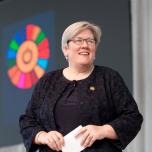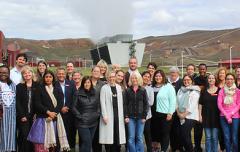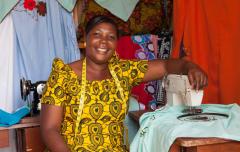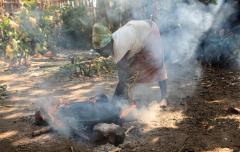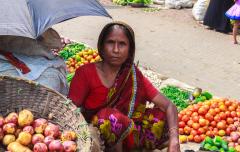Leaving no one behind and lifting us all up: how accelerating access and equality in energy for all can secure the energy transition
CEO and Special Representative of the UN Secretary General for Sustainable Energy for All, Rachel Kyte, blogs on our new People-Centered Accelerator and leaving no one behind in the energy transition.
July 10, 2017: We must leave no one behind. That was the rallying call of the Sustainable Development Goals and a central tenet of the political deal that made the Paris climate change agreement possible. Two historic global deals reached with the promise of a more inclusive as well as a cleaner, better future for all.
This then is a central challenge of the energy transition which is visibly underway in some parts of the world, with renewable energy taking up more and more of the mix and electric vehicles becoming common on the roads.
But this energy transition will have failed if it doesn’t allow us to extend energy services to households everywhere – the indigenous family living on traditional lands, the displaced person recently arrived in a strange city, the isolated rural far, the woman slum dweller.
Much of the focus on ending energy poverty is on the potential revolutionary impact of new business models combined with the falling prices of renewable energy. Policy makers are slowly waking to the promise of more integrated approaches to energy with grid and off grid energy services working together to improve resilience and to speed connection of communities that today live below and beyond the wires.
Yet to create energy systems that provide sustainable energy for all, we will have to shift mindsets and some myths built-up over decades of what energy systems should look like, who they should serve and how much they should cost.
We will need to be clear eyed about household roles: of who cooks, whose time is used to do what, who earns and who is in the home. We will have to think anew about how we manage, legislate and regulate the energy industry and what is important to us – efficiency? productivity? Affordability? There are also fresh questions on how we finance energy systems – and what we should pay for what levels of service?
By putting people at the heart of our energy plans, we can move our thinking past some of the traditional models – beyond just electrons running through wires - to what level of energy service delivery we need to provide electricity and clean cooking to everyone in a community, city or country. To reach the furthest, bundling clean, affordable energy services in new style social services and safety nets provisions may offer speed and scale over vertical energy service provision. There is room for further creativity if we focus on who and where those without services are as a priority.
Out of the 1 billion people who currently have no access to energy, there is a concentration of the most marginalized in society – the rural poor, disabled people, displaced families. This group is predominantly the furthest from the current energy system’s touch, and also predominantly has a female face.
Unsurprisingly, therefore, it is women who are working hard to drive creative and innovative solutions at the speed and scale we need to end energy poverty by putting those who are furthest, first.
The women creating the change understand that greater diversity throughout the energy sector will shift risk mindsets and perceptions, and lead to better decision making.
Putting the furthest first, and by doing so changing the way we think about energy services, is the reason why SEforALL announced the creation of a People-Centered Accelerator at the Sustainable Energy for All Forum in April 2017 to support gender equality, social inclusion and women’s empowerment in the energy sector.
The Accelerator has already bought together a diverse group of like-minded partners who are committed to working together to accelerate action that leaves no one behind. We have never had energy systems that reach everyone and the most recent Global Tracking Framework published earlier this year shows that while we may have made some progress, we are still significantly off track to meet our 2030 goals. We are at great risk of failing the ones that need our support the most.
Imagine a young woman, abandoned by her spouse with two young children, living on the edges of a large metropolitan informal settlement. She picks on the waste dumps with her kids and manages on a meager, unsteady income. She depends on expensive kerosene for both the households cooking and lighting. She has a pay as you go phone and charges that for a fee in a kiosk some way away.
How do we reach her? Through community services or energy services provided through a microfinance institution? Through clean energy services bundled with family payments provided by government, biometrically identified? Through subsidized clean energy home energy systems or microgrids within the settlements provided by commercial off-grid operators. It could be by any or all of the above. This Accelerator puts her first.
Earlier this month I was in Krafla, Northern Iceland to attend the Accelerator’s first working meeting, surrounded by inspiring SEforALL partners from across the world.
The desolate Icelandic landscape felt like the perfect place for this work to take place – a country where women have been at the forefront of democratic and social change for a century or more, and where women are now organized within the energy sector to further push for more equality.
Hosted by the power company Landsvirkjun at their geothermal plant, over 30 investors, NGOs, business leaders, practitioners and philanthropists from different backgrounds and all corners of the earth, came together to develop an action plan.
Many organizations are already engaged in meaningful work in this space. This Accelerator is where some of their work, together with others, blended can lead to an acceleration through new knowledge, shared experience, new insights or new partnerships. This Accelerator will be a place where we can come together to develop the knowledge and delivery of energy services that are fit for the future. We will use it as a place to generate the speed and scale of action on energy access and gender equality that we need.
We’ll formally launch the People-Centered Accelerator at COP23 in Bonn, Germany, with clear goals for 2018 and 2020.
Together, we can create an energy system that delivers for ‘we the peoples’, and enjoy the equitable, prosperous and strong economic future for all this will bring. Join us and be part of this exciting journey to build energy systems from the people up.
